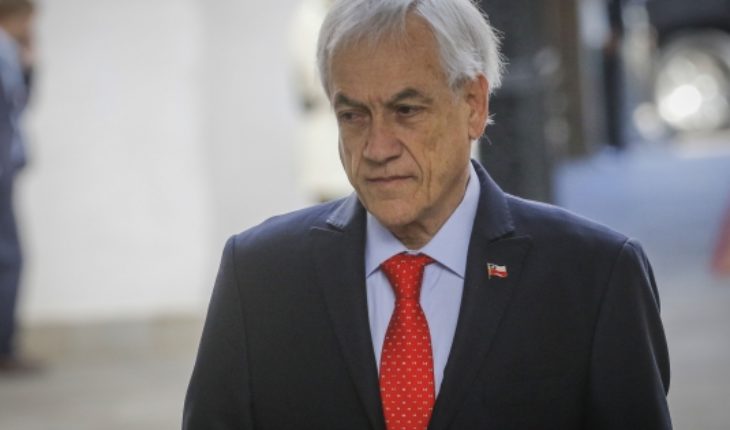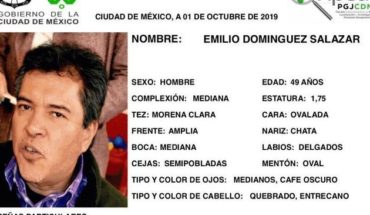An oxymoron is a rhetorical figure that consists in denying what is stated in the same sentence. Something like this seems to be happening in Chile since October 18, for while a political and business elite tries to launder its long history of elusions, collusion, miscellaneous tax evasion, use of insiderinformation, corruption of politicians, economic support for genocides, among many other behaviors that ended up filling the patience of Chileans and Chileans, another part of that elite remains covered by a fierce defense of self-interests, protected by the Constitution. The most symptomatic expression of this contradiction is that the President of the Republic himself, Sebastián Piñera, points out that he will create laws that pursue so-called crimes of the neck and tie, being himself responsible for a not less part of the behaviors typified in this new agenda. The obvious question is how came into this situation where words and deeds are confronted. Is our elite undergoing a dissonance process of some kind?
Between October and December 1503 Machiavelli made a famous legation to Rome, for the assumption of Pope Julius II, a declared enemy of César Borgia, the historical character who would serve as an exemplary example of what is political virtue in his famous book The Prince. However, this is very different from the previous 2, when the Florentine can see the rise and growth of the son of Pope Alexander VI. Gone were Senigallia’s ploy or the unification of Romagna, extraordinarily well planned and executed. The César Borgia who found Machiavelli in late 1503 is very different from that of only a year earlier. Virtually defeated by his father’s and his father’s arch-enemy, he has gradually lost the territories he had so hard to unify. However, an event expresses a teaching that we will then see repeated on multiple occasions in modern history. Machiavelli describes us to a guy who is no longer smiles at fortune or accompanied by virtue a few years earlier. This has its lapidary expression in the opinion that the Cardinal of Volterra conveys to the Florentine on November 14, 1503, where in the face of a situation that demands resolution and immediate action, the cardinal points out that he does not know whether Caesar will be capable: “because he seems to have found the duke unstable, irresolute and wary, without asserting himself in any decision, either by his nature or because these blows of fortune have left him astonished and he, unused to suffer them, only revolves around them”.
Machiavelli inadvertently describes with what happens to Valentino, a constitutive feature of the psychology of politics: the correlation between the dissolution of power and the way in which it is expressed in the personal debacle of those who have come to possess it at some point. Examples are followed in history. Even a few years ago the film The Fall (Germany, 2004) showed something similar, in an attempt to reconstruct Hitler’s last days. What happens in the minds of those who once had much power when they see that day by day it vanishes before their eyes? Why is the entropy of the political order correlated in such a way in the day-to-day actions of the ruler?
The case of Chile’s current president is a leading manifestation of this strange symbiosis.
Sebastián Piñera has seen his support crumble in all the polls. It has had contradictions with regard to decisions taken with the rest of the state powers, which in the medium to long term can bring it to trial for their responsibility for the serious violations of HRD that have been found by HRW or Amnesty International, as their denial to this day prevented appropriate measures to remedy them. The Pinochetist right is in opposition to the Presidency. The businesswoman has long had his own agenda and resigned to defend Piñera. It is shorter to find who supports Piñera… although at times it is difficult.
Apparently, the only loyal institution is still Carabineros. This is understandable, as it is a force that has lost two national directions in recent years and whose degree of legitimacy after Pacogate lies on the ground. He simply has no salvation anymore. It is likely that the intervention that will receive should be so profound, that its only hope of avoiding or rejecting it is that Sebastian Piñera will protect them until the end. Something already reported to us by the Director General himself (supported by the President’s words) will involve the discharge and personal judgments for those who have transgressed protocols. The attempt to personalize the conflict is the last move to try to save the image of the state and the police force as one more victim of the excesses of some individuals. The same thesis used to not intervene the FFAAs after Dictatorship. The violations of HRD in Chile were outbursts of brutality by Manuel Contreras.
What is described is a no less factor in maintaining hope. Violations of HRDs are ploying of hypocrisy in much of the political class, which turned a blind eye for decades of what any popular subject knows: that torture is a daily practice in interaction with lumpenproletariat. Sexual abuses did not begin today, they were already seen in 2011. What happened after that? Tear-dog bombs on the body have been documented protest after protest. In 2006, Bachelet requested the resignation of the Prefect and the Sub-Prefect of FEEE of Carabineros for the episodes of violence broadcastby by the media. What reforms were made to Carabineros so that he would not continue to suppress legitimate social protest, beyond those resignations? The massacre of the micro blocks from the Apumanque, in 1993, was backed by
Patrick Aylwin, among several other executions that were justified.
To be fair to Piñera, it is the old order that is dislocated today. The time of his fall may be more or less fast, depending on the emergence of a social and/or political actor (or that one becomes in the middle of the crisis) that is able to give it a direction towards a solution, but it will happen. Today the diagnosis of the causes that led to the crisis has a long literature accumulated. The impunity of the powerful, the kidnapping in the AFP system, a thankless education for all the actors involved in it, the theft of water, a health system in crisis, among many others. What is new is not in the discovery of these symptoms of the systemic crisis of neoliberalism, but in the discovery by the Chilean aristocracy that ordinary people knew. The strange thing is that this form of subhumanity or quasi-humanity (in the words of Richard Greene in his article, published in CIPER, The Yellow Vests on the Planet of the Apes), he realized, he knew. If the ordinary human being knows what is affecting his life from the beginning to the end and his most elementary daily life, it is a matter of time for him to raise an instance that unifies him and leads to victory against it.
Although that can’t necessarily be something beautiful or good. The light revolution invented the guillotine as a way to humanize justice. The Italian Nazis and fascists arrived with an anti-political and anti-elite discourse, but later allied with it.
The time that Sebastian Piñera lasts in the presidency is a titness. The more it is, the more systemic legitimacy will bleed out because of the urgent contradictions that will remain unresolved by a collapsed man and a political system unable to change. Moreover, it refuses to accept the dimension of the crisis, sustained in the mere weight of custom and the weak institutionality that shelters it. History recalls multiple forms of sovereignty that even held on sacred legitimacies and had armed men at their service to enforce the laws God had given forever to all.
And, although social mobilization so far continues to retain the tactical advantage in actions, preventing the normalization of daily life, that is, by forcing the government and its repressive and ideological apparatuses, to respond to exceed their capabilities, the changes do not happen. Although the protest found ways to sustain itself in time and ability to mutate. And while emerging articulations continue to build up moral strength and the various social struggles against an imbricated capitalism around 1% of society are widening and cohesive, yet nothing changes.
Nearly 2 months after the start of social mobilization throughout Chile, there is still no response to the requests we already describe and could not be otherwise. Moreover, the privatization agenda has not changed even on transport issues, the origin of the social conflict, as shown by the new bidding bases presented by the Ministry of Transport. Similar examples can be found in education, where lycées with numbers continue to be converted into Bicentennial lycées, incentivizing competition in the public system itself. The discounts obtained by FONASA’s “users” by the Ministry of Health allow them to buy from pharmacies that were colludated and, in addition, they have very high prices so far.
Examples could still be named in each of the areas that have appeared as demands for different mobilizations across the country. Even when they appear as high-level concessions, on the part of the establishment, as in the Peace Agreement and the New Constitution, they always end up coming in small print and defined by technical panels full of lobets and even people linked to illegal financing (See CIPERCHILE, Nicolás Sepúlveda and Benjamin Miranda, The ties with political and business power of the members of the Constituent Technical Commission).
Far from a strategy of defusing the motives of conflict, the members of the Executive and the Congress have devoted themselves to repeating the same gestures of contempt they made systematically, prior to the outbreak of 18 October. This, even though the mobilizations against the system have a majority that supports them, which is between 60% and 80% until today, according to the same favorite pollsters of the Executive. The example of FA MPs voting in favour of a law criminalising the barricades is an example of this constriction of words, but without changes in political attitude.
Does political power still fail to understand the clarity of messages, or do you think it has some way to get around the conflict?
This apparent state of shock in which the elite finds itself has seemed to imply fragmentation in their ability to integrate interests. Each power group seems to be carrying its own agenda and even contradictions are expressed within them, as cross-declarations between business groups by attitudes that are from the other sector have shown in recent days accused of populism.
However, this is something that must be properly weighted, because after all, the whole model is built on predation, whether it is about nature or the human, the pattern is the same. Salmon production in Chiloé had devastating results in seabed pollution, but also in the poor aftermath left by the ISA virus crisis, because of over-exploitation. The privatization of water is directly idenified with the mining business and the production of avocados that have without water entire sectors of the country, turning them into slaughter zones.
That’s why the citadel of your system is in the AFPs and its $210 billion in savings that serve as fresh money to finance their businesses. In this area are all the economic groups abased. They are therefore willing to change the Constitution, but not to eliminate the AFP system. While one has veto capacity with only a third of the constituents elected, the elimination of AFPs plays the very foundation of the extremely high rates of their capital gains.
The great hope of power is set in time. As he can control political deadlines thanks to institutionality, he believes that by buying time on mobilization and sticking to his agenda, which includes TPP11, reforming the pension system without eliminating AFPs, continuing to hang education outsourcing the benefits of the right to health, etc. However, the six months of mobilization in Hong Kong (tiny compared to powerful China) should have convinced them that this is a mistake. However, this has not been the case. The agenda behind Chile’s richest 1% has not only not changed, but has intensified. Aware that the big battles must be fought with all the forces, business groups and their state and private officials, appeal to the strategy of the good police and the bad police, trying to buy time to do the same as the times previous: generate changes so that nothing changes. Illus hope or denial of reality, or, perhaps, just a strategy to prepare for presidential change and get rid of the awkward Piñera, a subject who is hardly a shadow of himself.
But what if Sebastián Piñera operated a transformation beyond the cat-parlity inherent in Chile’s political system? He could, like the Sartrean protagonists, face his present and suit him, but for that he would have to stop being him. Not just gestures, not just words, no more empty phrases and full of clisés. Facts, simple concrete facts. Cleansed in their afact, like Allende’s last speech or O’Higgins’s abdication. Or less radical, but equally admired, like donating a fortune to develop a secular and pluralistic University, such as the Federico Santa Maria University. And it’s not that Sebastian Piñera doesn’t have a chance at his fingertips. For example, it owns the Tantauco Park, which is located on land belonging to the williches communities of the island of Chiloé, established in the Treaty of Tantauco that signs peace between Chile and Spain. Communities are the legitimate owners of these lands ancestrally. The President does not need any law to return them, and thereby he would make a gesture that would be considered admirable. A demonstration with facts that the richest 1% changed, in his exemplary figure, the President of all Chileans. Such a figure would emerge with legitimacy to direct the changes.
An oxymoron, isn’t it?
The content poured into this opinion column is the sole responsibility of its author, and does not necessarily reflect the editorial line or position of El Mostrador.





